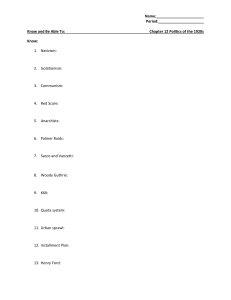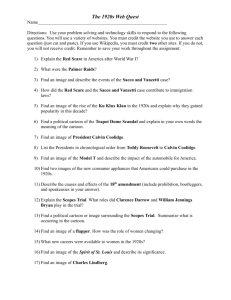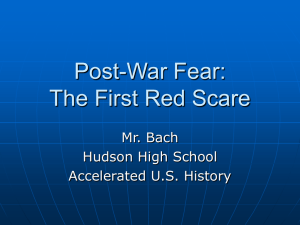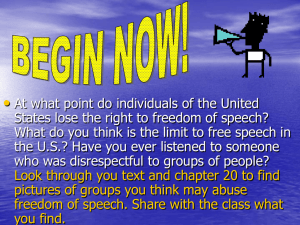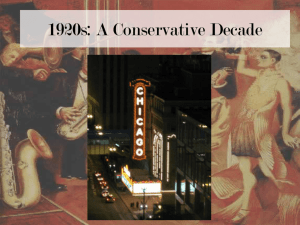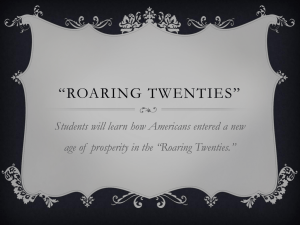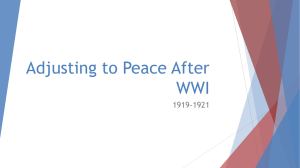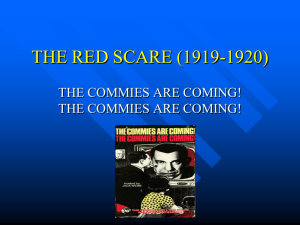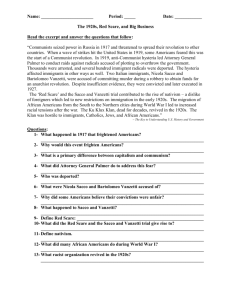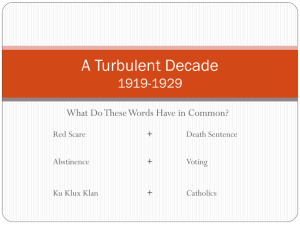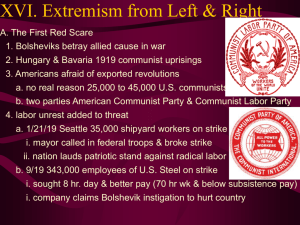The Roaring Twenties
advertisement
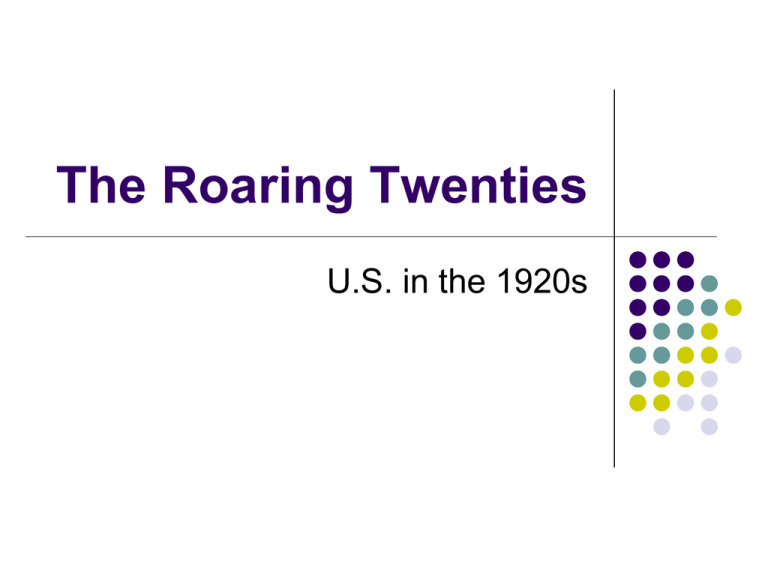
The Roaring Twenties U.S. in the 1920s The 1920s was: A turning point in the 20th century A time of conflicting values Traditional/rural & Urban/modern Aka: The Jazz Age “The parties were bigger… the pace was faster, the shows were broader, the buildings were higher, the morals were looser…” F. Scott Fitzgerald – The Great Gatsby Post World War I Isolationism The Lost Generation U.S. withdrew from foreign events Destruction & devastation of war > uncertainty, fear, & doubt for the future Big 3 authors: Stein, Fitzgerald, Hemingway Distrust of Russia Russian Revolution sparked fears of communism in the U.S. The Red Scare Red Scare Hatred of the “Hun” (German) transferred to Hatred of the “Reds” Red Scare refers to the widespread fear of communism Palmer Raids Attorney General Palmer led attacks against suspected radicals Aliens were deported Palmer Raids Immigration Issues Limiting Immigration Limited jobs & the Red Scare > backlash against foreigners “Nativists” re-emerge 1921 Quota National Origins Act 1924 Established number of immigrants allowed into U.S. from each nation Set quotas for each country at 2% of the number of people from that country living in the U.S. in 1890 Southern & Eastern European countries reduced significantly & Asian countries were nearly eliminated Sacco & Vanzetti Italian immigrants accused of robbery & murder Anarchists Results Sacco & Vanzetti At the trial… Public support Weak evidence against Sacco & Vanzetti Judge biased against immigrants Protests in Europe & South America broke out in support of the two men Results Convicted & executed in 1927 Historians debate guilt or innocence but agree political ideas played a key role 1920s Republican Presidents Warren G. Harding Less government in business & more business in government “Normalcy” Calvin Coolidge Favored Big Business Kellog-Briand Pact: 1928 treaty that rejected war as a means to solve problems Teapot Dome Scandal Oil reserves were taken from the navy & transferred to the Secretary of Interior: Albert Fall Fall secretly leased oil to companies (took bribes) Fall was the 1st cabinet member to go to JAIL 1920s Economy “Roaring ’20s” not so roaring Agriculture Farmers suffering Weather conditions U.S. loans money to Germany Germany owes Allies Effects of WWI Soldiers returning from war can’t get jobs Reparations system leads to debt Allies owe U.S. Labor Issues 1919 One of the most explosive times in the history of the labor movement Strikes 1919 Seattle Workers Disappointed that hard work in WWI wasn’t rewarded Red Scare sentiment weakened unions Boston Police Strike Nation’s 1st major general strike Shut down the city Initially started in the shipyards Police protested low wages & poor working conditions Calvin Coolidge’s role Steel strike Leader John Lewis worked for shorter hours & safer working conditions Police Strike “There can be no right to strike against the public safety by anybody, anywhere, anytime” - Coolidge Henry Ford Known for the Assembly Line Paid workers well because he realized that workers were also CONSUMERS Robotic work > anyone (all skill levels) could work in factory Working Women Common jobs for women included Nurse, secretary, factory job (overqualified) Paid less than men Gender Issues *First time educated men & women could meet in the workplace … Hmmmm
